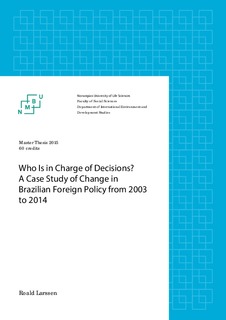| dc.description.abstract | Brazil has for centuries been identified as a country destined for greatness due to its resources and size. Yet, its politicians and leaders have not made the vision come true. This has left the South American country as a somewhat sleeping giant in international politics.
President Lula came close to fulfill the vision of greatness. From 2003 to 2010, Brazil emerged as a pivotal actor. Its international commitment grew formidably. Yet, despite of representing the same party and being Lula’s handpicked successor, Dilma Rousseff seemed to give the vision little attention as changes in the foreign policy were introduced.
This case study analyses why changes in Brazil’s foreign policy occurred after the inauguration of Rousseff. It does so by first identifying changes. This is done by comparing the foreign policies of Lula and Rousseff on four areas: Brazil’s global role, Brazil and regionalism, the relation between Brasília and Washington, and the topic of human rights. Three central changes are found: 1) A move from expansion and activism to cool down and agenda setting in Brasília’s global role. 2) A rhetorical drift of emphasis in human rights from economic, social and cultural rights to civil and political rights. 3) A changed US-Brazil relation from distant and fruitful cooperation to warm and friendly ties before ending up cold. When putting the three together, changes are defined as a cool down of activism and foreign affairs activities.
After identifying what kind of changes have occurred, the thesis is able to analyze why it happened. Four levels of analysis in foreign policy analysis laid the foundation for four variables to explain changes: economic power, emotions, lacking party support, and bureaucratic influence. Findings suggest that the four variables differ in explaining changes. While economic indicators conclude that Dilma’s Brazil was more powerful than Lula’s Brazil, literature findings suggest that President Rousseff was challenged by far bigger economic problems. In addition, the international structure was less favorable. The variable, economic power, can thus partly explain why Brazilian foreign policy changed. Emotions and bureaucratic influence are more successful in explaining changes. Collected data strongly suggest that emotions received from early experience to 1985 influenced Brazilian foreign policy. And the thesis reveals that the bureaucratic actor Itamaraty failed to convince Dilma about foreign affairs’ importance. Budget cuts and a disinterested president left Itamaraty with little influence. This resulted in a passive foreign policy. Lastly, findings suggest that it is hard to prove if lacking party support influenced Brazilian foreign policy. Although not proven, it is likely that lacking support made Dilma use much time on consolidating and legitimating her presidency. | nb_NO |

